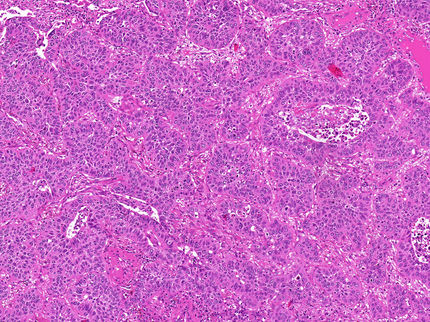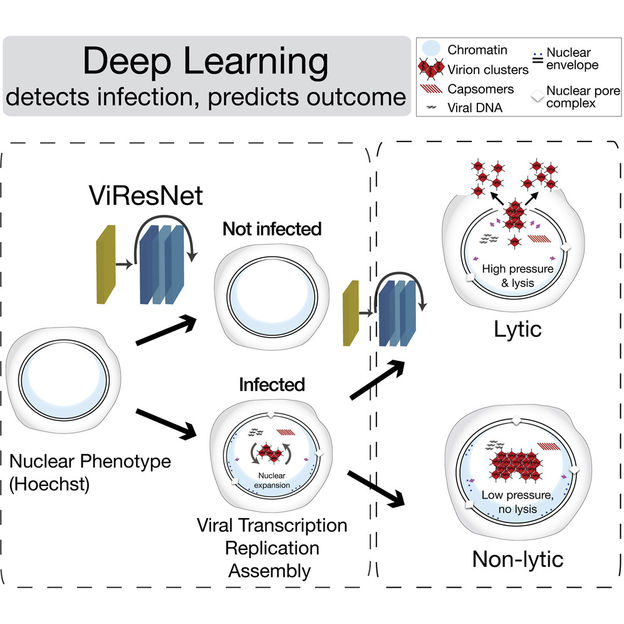Breakthrough for describing soft matter through AI
"This powerful combination of essentially simple basic techniques has opened a new chapter in density functional theory"
Scientists from Bayreuth have developed a new method for studying liquid and soft matter using artificial intelligence. In a study now published in the journal "Proceedings of the National Academy of Sciences of the United States of America" (PNAS), they open up a new chapter in density functional theory with their "neural functional theory".

Symbolic image
Computer-generated image
We live in a highly technologised world where basic research is the engine of innovation, in a dense and complex web of interrelationships and interdependencies. The published research provides new methods that can have a great influence on widespread simulation techniques, so that complex substances can be investigated on computers more quickly, more precisely and more deeply. In the future, this could have an influence on product and process design. The fact that the structure of liquids can be excellently represented by the newly formulated neural mathematical relationships is a major breakthrough that opens up a range of possibilities for gaining deep physical insights.
"In the study, we demonstrate how artificial intelligence can be used to carry out fundamental theoretical physics that addresses the behaviour of fluids and other complex soft matter systems," says Prof. Dr. Matthias Schmidt, Chair of Theoretical Physics II at the University of Bayreuth, and explains: "We have developed an advanced scientific method to study matter at the atomic and (macro)molecular level, combining machine learning and mathematical methods to calculate complex physical properties."
The Bayreuth researchers present a hybrid scheme based on classical density functional theory and machine learning to determine the equilibrium structure and thermodynamics of fluids under a variety of influences. Schmidt reports: "We demonstrate the use of the neural functional in the self-consistent computation of density profiles. The quality of the results exceeds the state of the art of fundamental-measure density functional theory. The results establish machine learning of functionals as an efficient tool for the multiscale description of soft matter." Thus, fundamental insights into the structure of matter are gained. The type of matter can be mundane, but it can also be the basis of technological processes and commercial products. "This powerful combination of essentially simple basic techniques has opened a new chapter in density functional theory," says Schmidt, "because networks trained by simulation data are more accurate than the currently best theoretical approximations designed 'by hand', i.e. with paper and pencil."
Schmidt emphasises: "In addition to the significance for the particular field of statistical mechanics of soft matter, I think our method also raises fundamental questions about the human self-understanding of our intellectual activity. For myself, our study gives considerable hope for developments where artificial intelligence, rather than replacing us, expands us in a way that I find very surprising."
Original publication
Florian Sammüller, Sophie Hermann, Daniel de las Heras, Matthias Schmidt; "Neural functional theory for inhomogeneous fluids: Fundamentals and applications"; Proceedings of the National Academy of Sciences, Volume 120, 2023-12-7
Florian Sammüller, Sophie Hermann, and Matthias Schmidt; Why neural functionals suit statistical mechanics; arXiv:2312.04681
Most read news
Original publication
Florian Sammüller, Sophie Hermann, Daniel de las Heras, Matthias Schmidt; "Neural functional theory for inhomogeneous fluids: Fundamentals and applications"; Proceedings of the National Academy of Sciences, Volume 120, 2023-12-7
Florian Sammüller, Sophie Hermann, and Matthias Schmidt; Why neural functionals suit statistical mechanics; arXiv:2312.04681
Topics
Organizations
Other news from the department science

Get the analytics and lab tech industry in your inbox
By submitting this form you agree that LUMITOS AG will send you the newsletter(s) selected above by email. Your data will not be passed on to third parties. Your data will be stored and processed in accordance with our data protection regulations. LUMITOS may contact you by email for the purpose of advertising or market and opinion surveys. You can revoke your consent at any time without giving reasons to LUMITOS AG, Ernst-Augustin-Str. 2, 12489 Berlin, Germany or by e-mail at revoke@lumitos.com with effect for the future. In addition, each email contains a link to unsubscribe from the corresponding newsletter.



























































